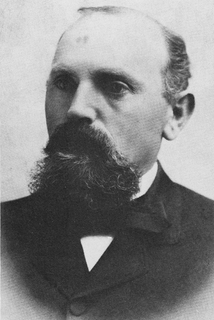 Henry N. Jaffa (Museum of Albuquerque)
Henry N. Jaffa (Museum of Albuquerque)
Albuquerque’s First Elected Mayor
During New Town’s infancy, Albuquerque’s early promoters found that they were at a disadvantage without some sort of governance in place. In 1882, prominent businessmen created a Board of Trade. This organization was essentially a chamber of commerce. The Board of Trade established a Merchant’s Police Force to maintain order and began assessing members for funds to pay for municipal projects.
This situation worked until 1884 when New Town pushed to take the county seat from Bernalillo. Santiago Baca, William Hazeldine and Harvey B. Fergusson spearheaded a drive for incorporation as a town. A meeting was held at Grant’s Opera House on Railroad and Third Streets on July 28th, 1884 that led to the creation of a town charter and the call for an election. The balloting was held on June 4, 1885 and was approved almost four to one. This was possible because new territorial laws were created in 1884 that allowed for, and listed, the powers of town governments.
At a follow-up election held on July 4, 1885, Henry Jaffa was elected the town’s first mayor. Jaffa had been the president of the Board of Trade and had worked hand in glove with most of the citizens at the top of the economic and social spectrum. Jaffa was a native of Germany of Jewish descent and had come southwest to seek his fortune with his brother, Samuel, first developing a prestigious mercantile firm in Trinidad, Colorado. He moved to New Town after the arrival of the railroad and opened a business near the railroad terminal.
Along with Jaffa, four trustees were elected to constitute a municipal governing board. All were small businessmen. They set upon raising revenues by assessing merchants for “voluntary” contributions before deciding to sell business licenses. The license for a saloon at that time was the largest at $450 but hotels, shops and other professional men paid commensurately stiff license fees.
-- from “Albuquerque, a Narrative History” by Marc Simmons 1982
During New Town’s infancy, Albuquerque’s early promoters found that they were at a disadvantage without some sort of governance in place. In 1882, prominent businessmen created a Board of Trade. This organization was essentially a chamber of commerce. The Board of Trade established a Merchant’s Police Force to maintain order and began assessing members for funds to pay for municipal projects.
This situation worked until 1884 when New Town pushed to take the county seat from Bernalillo. Santiago Baca, William Hazeldine and Harvey B. Fergusson spearheaded a drive for incorporation as a town. A meeting was held at Grant’s Opera House on Railroad and Third Streets on July 28th, 1884 that led to the creation of a town charter and the call for an election. The balloting was held on June 4, 1885 and was approved almost four to one. This was possible because new territorial laws were created in 1884 that allowed for, and listed, the powers of town governments.
At a follow-up election held on July 4, 1885, Henry Jaffa was elected the town’s first mayor. Jaffa had been the president of the Board of Trade and had worked hand in glove with most of the citizens at the top of the economic and social spectrum. Jaffa was a native of Germany of Jewish descent and had come southwest to seek his fortune with his brother, Samuel, first developing a prestigious mercantile firm in Trinidad, Colorado. He moved to New Town after the arrival of the railroad and opened a business near the railroad terminal.
Along with Jaffa, four trustees were elected to constitute a municipal governing board. All were small businessmen. They set upon raising revenues by assessing merchants for “voluntary” contributions before deciding to sell business licenses. The license for a saloon at that time was the largest at $450 but hotels, shops and other professional men paid commensurately stiff license fees.
-- from “Albuquerque, a Narrative History” by Marc Simmons 1982